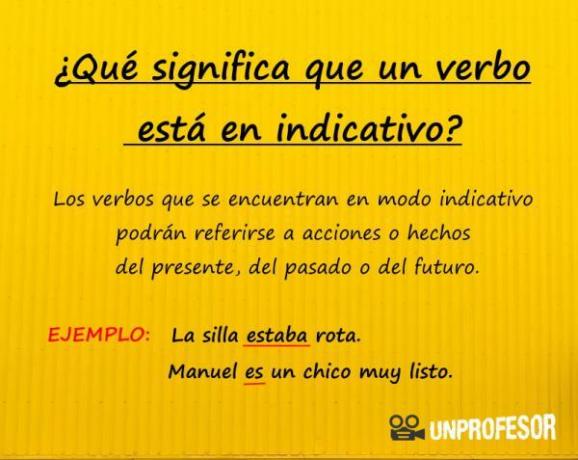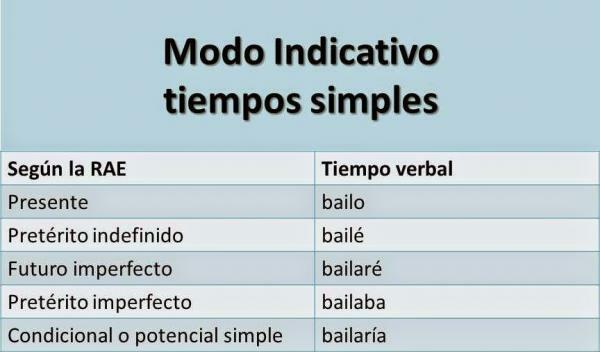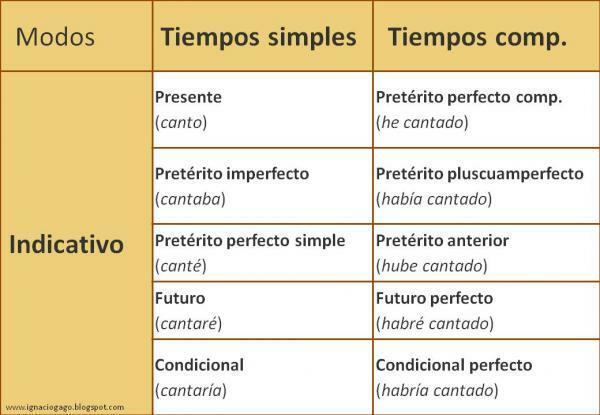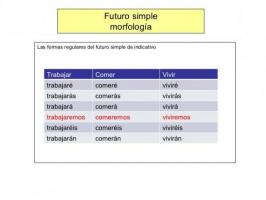What does it mean that a VERB is in INDICATIVE

In Spanish, verbs have different forms that help us express actions in different ways. This time in this lesson from a TEACHER we want to talk about what does it mean that a verb is in the indicative. For this we are going to define what the indicative mode is, the characteristics it has and the times that you can find within it. In this way you will be able to be more clear about how and where to use it correctly.
Verbs have different modes, these are the different forms that can express the action of a specific verb. Through the mode you can classify the state in which the action is always from the speaker's point of view. In other words, the verbal modes are those that show the attitude of the issuer and how he perceives the action. In Spanish we find different modes depending on the attitude of the speaker:
- Indicative: action perceived as real
- Subjunctive: action perceived as subjective.
- Imperative: action perceived as appealing.
So when we speak in an indicative way, we are doing it because said verb has a grammatical characteristic that will make its conjugation vary. In addition, since it is a personal vision of the speaker, we can say that the action of the verb found in the indicative is
perceived as real by the issuer of the message.In other words, we speak indicatively when we refer to the form that the verb takes to express that an action is objective or real, using different verb tenses or forms, whether they are simple or compound from the point of view of the issuer. On the other hand, the verbs that are in the indicative mood, in addition to being able to be conjugated according to different verb tenses, they may also refer to actions or events of the present, past or of the future.
In this other lesson we will discover the verb tenses in spanishso that you better learn everything related to the conjugation of verbs.

Once you know what the modes are and more specifically the indicative mode, it is time to deepen on the subject and indicate which are the characteristics that will allow you to identify it in any sentence or text. Thus, we could point out the following:
- It is used to indicate a specific action that may change if we change the time of it. That is, the action will change if we refer to it in present, past or future.
- They serve to express actions that actually exist or are likely. In other words, they refer to those that are objective and that are reflected in reality.
- They express proven facts, real or concrete. That is, they will not be used when we want to talk about something that is probable, wishes or orders. In these cases we must resort to the subjunctive and the imperative.
- It is used to express ideas of something that has already happened, is happening or will happen and that the issuer considers to be certain.

Image: Spelling inquiries
Within the indicative mood we can find different verb tenses that aim to express the different actions according to the present, past or future, depending on the moment in which the action. These can be simple or compound. Therefore, the simple verb tenses of the indicative mood are:
- Present indicative: the action of the verb is done at the moment in which you are speaking.
- Perfect tense: the action has been performed previously and has ended.
- Imperfect past: the action has been performed in the past but has not finished.
- Future simple indicative: the action will occur after the moment it is spoken.
- Conditional: action can occur, it is very likely. There is security in this regard.
- On the other hand we meet the times compounds In indicative, which are the ones that we show you below:
- Past perfect compound: used when the action has already finished
- Past perfect: the action is finished, but it is always related to a previous action.
- Perfect future: the expressed action will have ended when another action arises that will also occur in the future.
- Perfect conditiontal: probable actions already completed.

In order to better understand what the indicative mode is and how you can identify it, we are going to show you a series of sentences in which the verb appears in this way reflected in different tenses verbal:
Examples in present indicative
- Manuel it is a very clever boy.
- Your aunt he to the movies.
- This actor act very well.
- Food this hot.
Examples in past imperfect
- Not the kids they made homework yesterday.
- The chair was broken.
Simple future indicative examples
- I will go see you tomorrow
- Sunrise will buy the ingredients we need to make food.
Examples in past perfect compound indicative
- Already I read that book and I loved it.
- Esteban she has been living in Aragon.
Pluperfect indicative examples
- He told me that I knowhe had laughed a lot with the movie.
- When I arrived Miguel already he had reviewed the reports.
Future perfect indicative examples
- By the time you arrive I will will have showered.
- Tomorrow the bricklayer already will have finished with the work.
Examples in perfect conditional indicative
- If you had told them before they they would have come to home.
- It's clear they would have done the same as us in that situation.
Verbs in the indicative mood are widely used, so it is convenient to know how to identify them correctly. If you want to continue acquiring knowledge with lessons such as What does it mean that a verb is in the indicative?, take a look at everything that we can show you in our sections of Spanish language.



